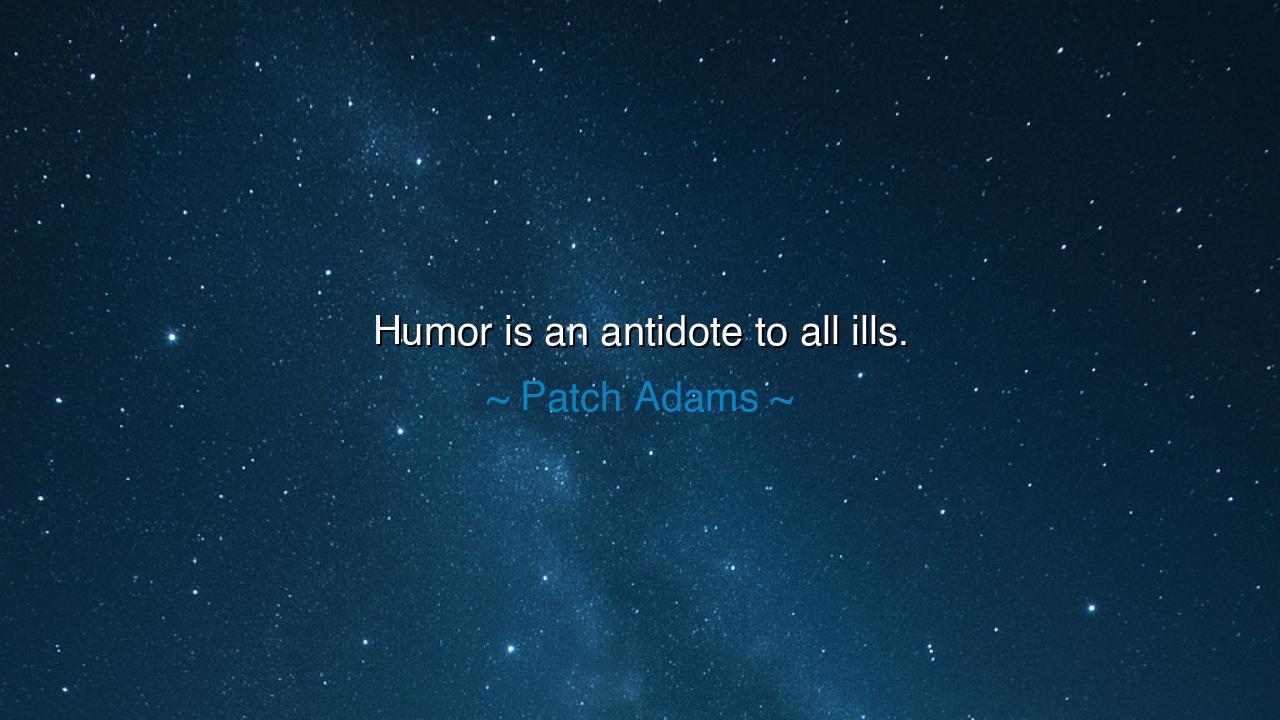
Humor is an antidote to all ills.






In the immortal words of Patch Adams, healer, dreamer, and clown of compassion, we are given a truth that gleams like gold drawn from the depths of human experience: “Humor is an antidote to all ills.” These words, though simple, hold the weight of both laughter and sorrow, for they were born not in ease, but in the crucible of pain. Patch Adams, the physician who wore joy like armor, learned through suffering that the human spirit cannot be cured by medicine alone. Humor, he discovered, is not mere amusement—it is the medicine of the soul, the sacred force that can restore light to even the darkest corners of the heart.
To call humor an antidote is to speak as the ancients did when they spoke of balance, for laughter does not erase pain—it transforms it. It turns despair into resilience, fear into courage, and isolation into communion. Just as the body needs healing herbs to fight poison, the spirit needs laughter to cleanse itself of bitterness. When we laugh, our burdens lift, our hearts expand, and for a brief, holy moment, we remember that we are alive, and that life, though cruel at times, still contains wonder. Thus, laughter becomes not a denial of suffering, but a form of wisdom—a declaration that the soul remains unconquered.
Consider the story of Patch Adams himself, whose life is the embodiment of his creed. In his youth, he was crushed by despair, even driven to thoughts of ending his life. Yet in the hospital, where he sought healing, he discovered that laughter—gentle, human, absurd—could awaken both patient and doctor alike. He dressed as a clown, told jokes to the sick, and turned wards of pain into sanctuaries of joy. Those who had lost all hope began to smile again. He learned that humor did not merely comfort—it healed. It stirred the immune system, lifted the heart, and bound the souls of strangers together. His laughter was not foolishness—it was medicine made divine.
But the truth of this wisdom stretches far beyond one man or one time. The ancients, too, understood that laughter was sacred. The philosopher Democritus was called “the laughing philosopher,” for he believed that laughter was the only fitting response to the folly of the world. While others raged at human weakness, Democritus laughed—not in cruelty, but in compassion. He saw that man’s errors were part of his divine comedy, and that laughter, born from understanding, was the highest expression of mercy. From that laughter, serenity was born. Thus, through humor, the wise find peace even amidst chaos.
In humor, there is also humility, for to laugh at oneself is to be free from vanity and pride. The one who can smile at his own foolishness cannot be destroyed by shame. Humor breaks the chains of ego and brings us into harmony with others. It reminds us that no one stands above the absurdities of life—that kings and beggars alike slip upon the same banana peel. This is why humor heals—because it equalizes, humanizes, and unites. When we laugh together, all barriers fall, and the walls that separate us crumble into dust.
Yet, let no one mistake humor for frivolity. It is a form of courage, a fire that burns quietly within those who refuse to surrender to despair. In war, soldiers have told jokes before battle. In hospitals, nurses have shared laughter between tears. In exile, prisoners have laughed at their captors and, in that laughter, reclaimed their dignity. For laughter is not weakness; it is defiance—the soul’s rebellion against suffering. It says, “You may wound my body, but you cannot crush my spirit.”
And so, children of tomorrow, learn from this teaching of Patch Adams: cultivate your laughter as you would your health. Laugh not out of mockery, but out of love. Laugh to soothe pain, to break fear, to awaken hope. When grief visits you, do not hide from it—but when you can, let a gentle smile rise from within. It will not erase the pain, but it will light a candle within it. Practice the art of humor daily—find it in small things, in mistakes, in the ordinary absurdity of being human. For those who can laugh, even softly, in the face of hardship, have found the truest form of strength.
Thus, remember always: humor is an antidote to all ills, not because it cures the world’s sorrows, but because it heals the heart that must bear them. Where medicine tends to the body, laughter restores the soul. Let it be your companion in darkness, your healer in grief, and your banner in joy. For as long as you can laugh, you will never be defeated—and the spirit of life will live on through you, shining brighter than pain, stronger than despair, and freer than fear.






AAdministratorAdministrator
Welcome, honored guests. Please leave a comment, we will respond soon